Democrats Are Turning Immigration Into a Moral Ultimatum
Why have attitudes on immigration gotten so much more radical in recent years? Hint: It’s not just Trump.
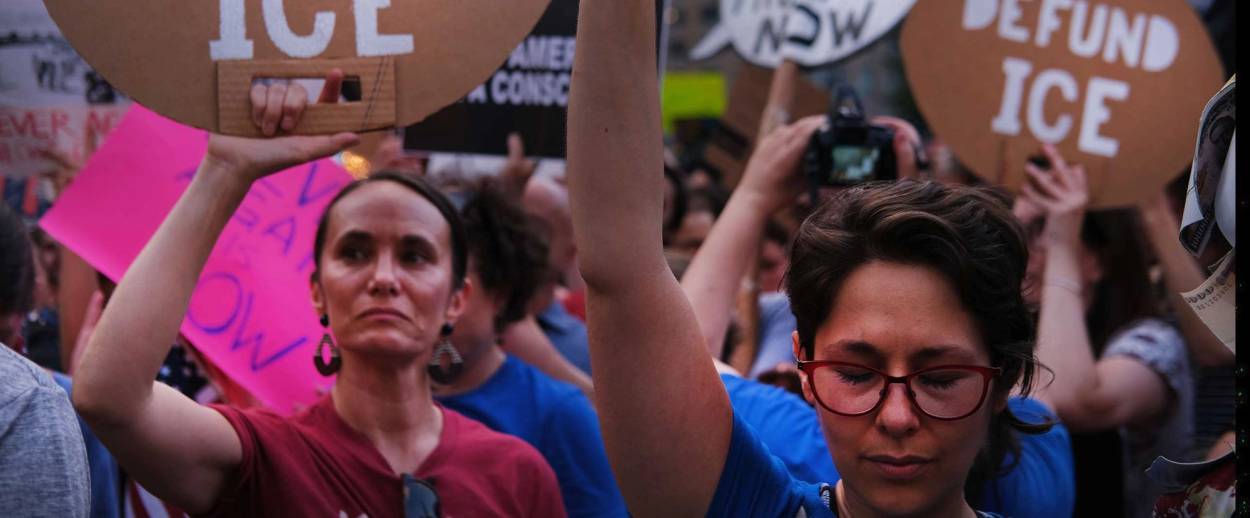
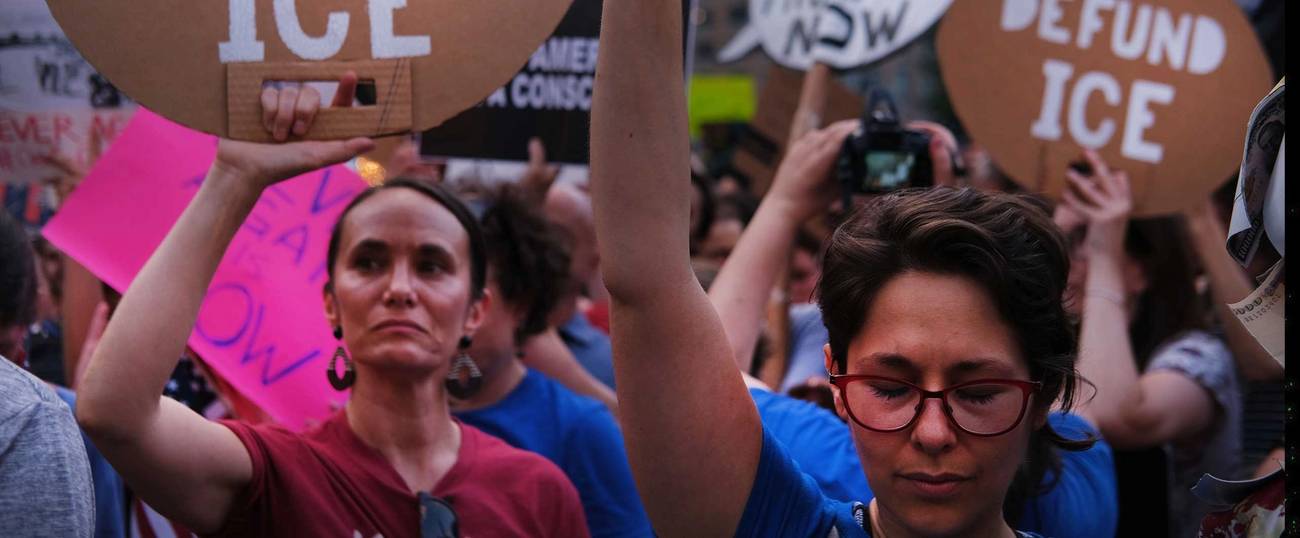


Deciding who does and does not get to become an American has never been simply a matter of law. In the U.S., immigration has long been a social gospel as well a policy question; a balance of moral and practical considerations. We’ve come a long way since the bigoted nativism of early 20th century anti-immigrant crusaders, but in our own time it’s the moral mythologies of liberal Democrats that have become increasingly detached from practical realties. The traditionally pro-immigration Democratic Party has not simply become more pro-immigration in recent years. Rather, in a fairly rapid shift over the past two decades, the party leadership and faithful have adopted a radical new framework that treats any restrictions on immigration and enforcement of current laws as immoral.
Sensible immigration reforms and policies that long commanded the support of majorities in both parties are now decried as veiled racism. In their place, the progressive wing of the Democratic Party is pushing for an immigration vision that borders on open-borders advocacy. Three years into the Trump administration, some of the radicalization on the left is undoubtedly responding to the reports of deportations, squalid conditions in detention facilities and the increasing normalization of nativist rhetoric from the White House. But Trump is not the fundamental driver of this phenomenon, which started before he took office and fits into the larger pattern of “white saviorism” pulling the Democrats to the left.
To be sure, not all of the blame for the current immigration impasse can be laid at the feet of the Democratic Party. Business-oriented Republicans have exploited low-skill immigration for years, while the tea party House Republicans effectively killed a reasonable overhaul compromise in 2013. But none of that is sufficient to explain the Democrats’ internal repositioning. To grasp how fast and how far the political winds have shifted, consider these statistics: The percentage of Democrats who view illegal immigration as a “somewhat” or “very serious” problem fell 30 points in just five years between 2014 and 2019 from 80% to 50%; the percentage of Democrats who think that large influxes of refugees and immigrants into the U.S. is a “critical threat” went from 62% in 2002 to 19% in 2018; the percentage of Democrats who support fining employers who hire illegal immigrants dropped from 61% in 2010 to a low of 38% in 2017; the percentage of Democrats who favor increasing the number of border patrols on the U.S.-Mexican border declined from 46% in 2010 to 26% in 2017; the percentage of Democrats who support conditioning amnesty and citizenship for illegal immigrants on learning English fell 16 points between 2006 and 2013 from 85% to 69% (this stipulation was also removed from the Democratic Party platform in 2016); and the percent of democrats who regard controlling and reducing immigration as an important policy goal fell from 51% in 2008 to 19% in 2018. (The sources for the data featured in this article can be accessed here).
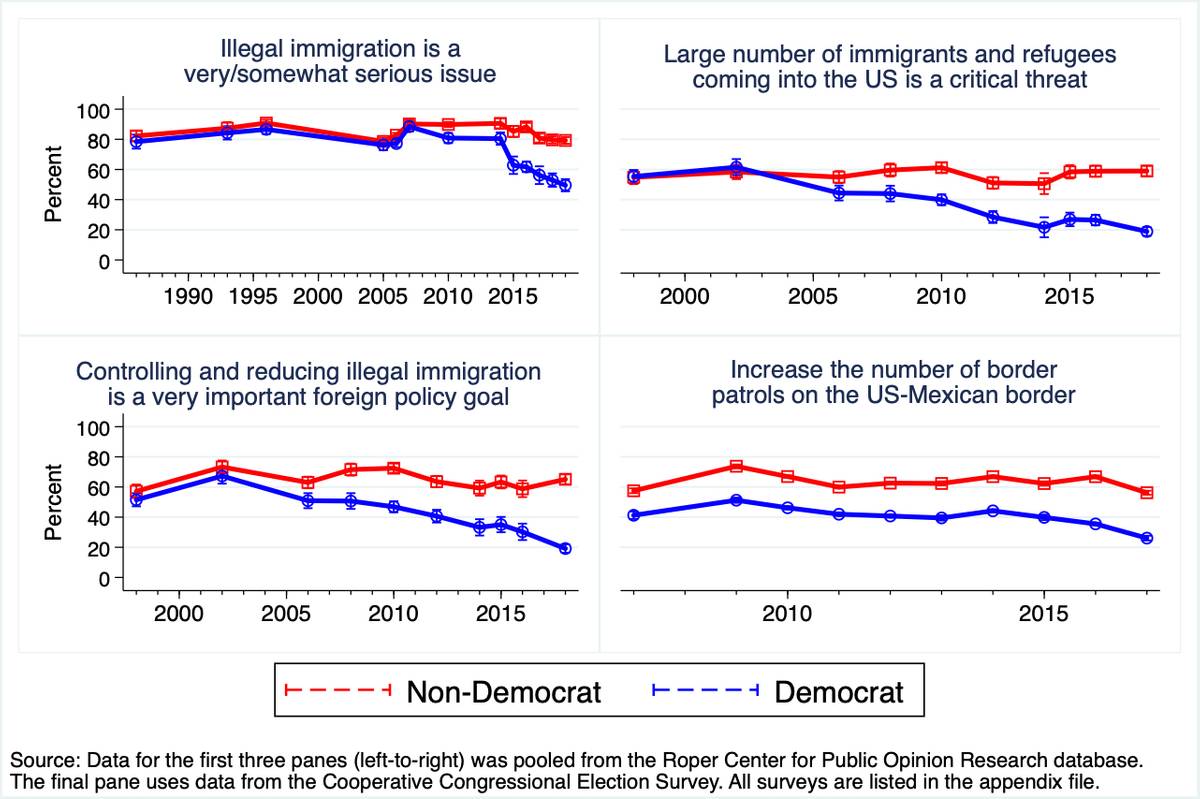
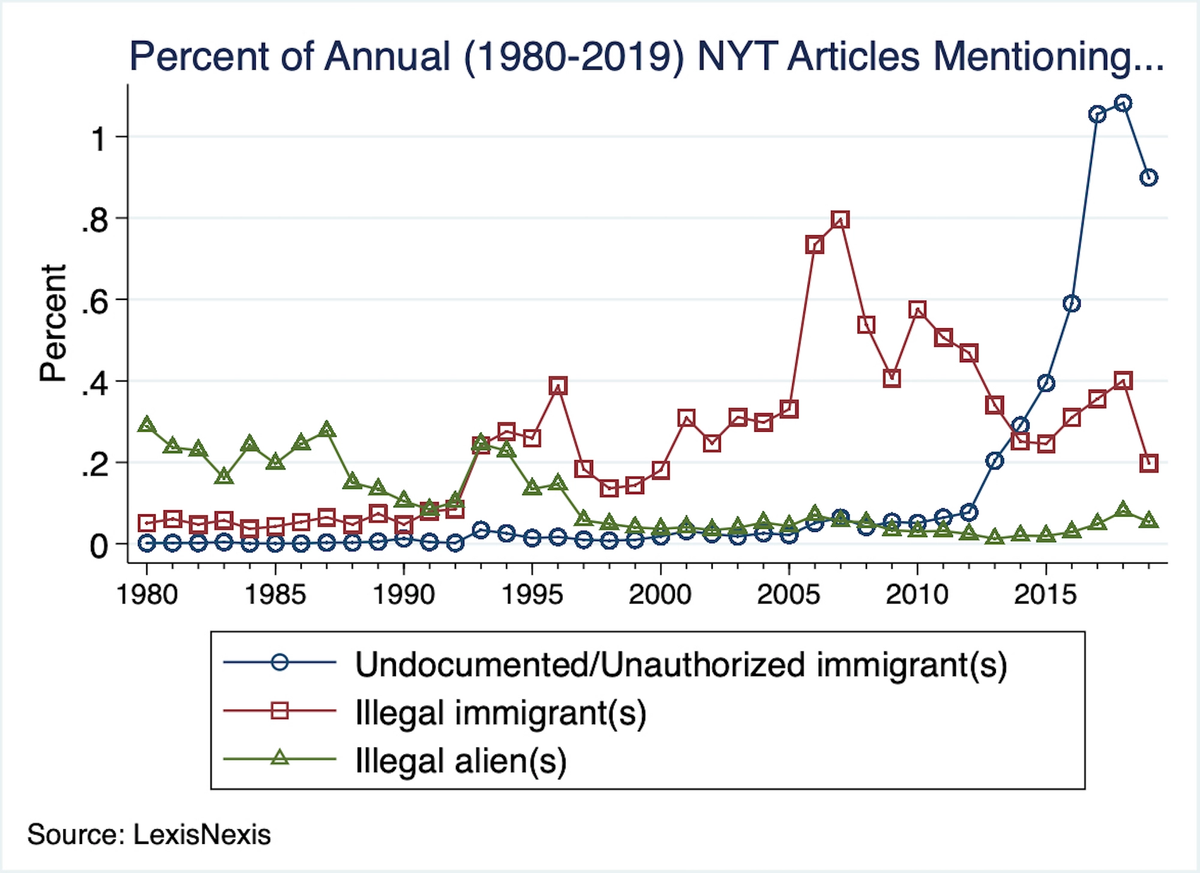
It’s against this backdrop that the 2020 Democratic presidential candidates are jockeying for position and appealing to primary voters. Just a few weeks ago, House Speaker Nancy Pelosi argued that you “cannot say anybody coming across the border is breaking the law.” This came in the wake of a televised debate in which all but two Democratic candidates raised their hands when asked who among them would decriminalize illegal border crossings, while all candidates indicated their support for underwriting the health care of illegal immigrants.
Such attitudes are obviously opposed by Republicans and conservative voters, but they also have some Democrats worried. In the aftermath of the debate The Washington Postreported on “several influential Hispanic leaders … warning that Democratic candidates are risking moving too far left in their quest to woo Hispanic voters.” One of those leaders, Domingo Garcia, president of the League of United Latin American Citizens, told the Post, “I think there has to be some moderation. I disagree with the candidates’ positions about providing health care to undocumented immigrants, when you have Americans who don’t have health care.” Also quoted in the article was former Obama aide Cecilia Muñoz who worried that efforts to decriminalize border crossings would allow the president “to make a claim that [Trump] is already making, which is Democrats are for an open border,” which would in turn, “make it harder for Democrats to combat President Trump’s populist appeal.”
The moralizing tenor of the debate can appear to be a series of all-or-nothing choices, but the Democrats’ current approach isn’t the only possible way to promote immigration to the U.S. One alternative is the Canadian-style points-based immigration system that favors immigrants with in-demand job skills and educational backgrounds. But a growing majority of Democrats don’t want that either. Instead, 54% of Democrats, up from 32% in 2013, support the status quo of prioritizing immigrants who have family members in the U.S. As House Speaker Pelosi recently put it: “Merit is a really condescending word. Are they saying family is without merit? Are they saying most that have ever come to the United States in the history of our country are without merit because they don’t have an engineering degree?”
Moderates and pundits may fret over pushing voters toward Trump in the 2020 election but it’s clear that more radical immigration policies appeal to a significant segment of voting Democrats. This is especially so among the party’s influential, “activist” liberal wing that is most likely to donate money to or contact Democratic candidates and vote in the party’s primaries. On the other hand, my research finds that Democrats who support more restrictive immigration policies are also more likely to report engaging in self-censorship out of fear of being thought of as a “bad person.”
One recent poll found that half of likely primary voters support decriminalizing illegal immigration. And, despite protestations that they’re “not for open borders,” a 2018 Harris-Harvard poll found that more than 1 in 3 Democrats, 36%, and just under half, 46%, of liberals say they prefer having “open” to “secure borders.” A more recent Rasmussen survey further shows that 65% of Democrats believe that opening “our borders to anyone who wants to come here as long as they are not a terrorist or a criminal” is better for the U.S. than tightly controlling who comes into the country (26%). All told, when you couple the above with opposition among majorities of Democrats to standard immigration-restriction policies and connect the dots, at the very least, it’s hard to make the case that the party is “anti-open borders.” In fact, 49% of the public believes—versus 36% who do not believe—that it is for open borders. And who can really blame them? If public perceptions are mistaken, Democrats have and have had ample opportunity to set the record straight.
A recent study found that liberal immigration attitudes are more likely to be energized by stronger moral convictions. Other research shows that the moralization of political attitudes makes them more resistant to consequentialist or cost/benefit reasoning. In other words, once moral reasoning takes over a political question, practical or utilitarian arguments lose their ability to persuade. For Democrats this is becoming the case even when the practical questions relate to matters, like income inequality, that are also important to them. Between a moralized political question and a matter of practical politics, it seems, the moral side will always win. There is ample evidence, for instance, that sustained low-skill immigration harms the livelihoods of low-skilled natives, at least in the short run, and the stability of the economy and welfare state in the long run. But these sorts of arguments have little power against a moral case increasingly prevalent in elite quarters that advocates an open-borders immigration policy as a form of “reparations” for America’s historical sins.
Here is how a recent New York Times essay put it:
What is good immigration policy for the United States is separate from what is just and moral for the peoples whose destiny America, past and present, has affected. It might make economic sense for the United States to let in more skilled Indians and fewer unskilled Latinos, but America owes them more, and it should open its doors more to its southern neighbors.
My own research shows that white guilt and privilege awareness, which are most pronounced among liberals, are indeed related to support for increasing immigration. The trappings of this moral psychology are further evident in the graph below, which shows that white Democrats are significantly more likely to endorse prioritizing the welfare of the poorest people in developing countries over that of the poorest Americans.
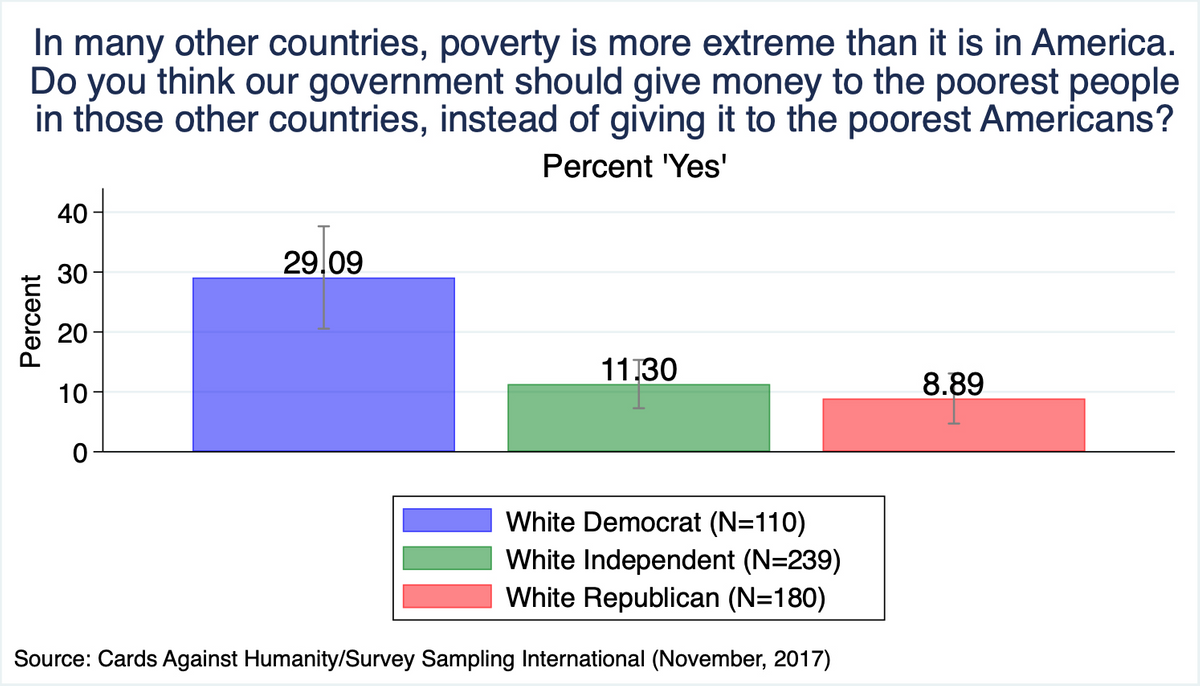
Whatever one thinks of the merits of this moral persuasion, the fact is that many Amerians, including Democrats and crucial swing voters who could decide the 2020 election, don’t share them. For such individuals, appeals to guilt and privilege will fall on deaf ears, or worse, backfire. Moral considerations should have a place in any national immigration debate. But when they begin to consume it altogether they risk prodding a cycle of backlash rather than promoting compromise and incremental reform.
***
Like this article? Sign up for our Daily Digest to get Tablet magazine’s new content in your inbox each morning.
Zach Goldberg is a doctoral candidate in Political Science at Georgia State University. His Twitter feed is @ZachG932.